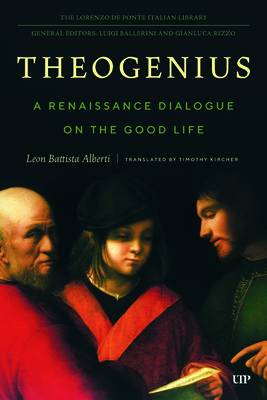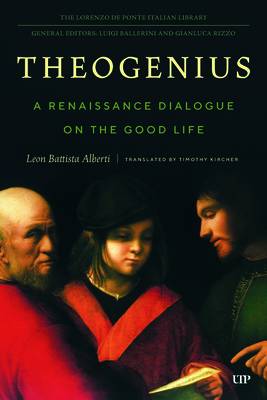
- Afhalen na 1 uur in een winkel met voorraad
- Gratis thuislevering in België vanaf € 30
- Ruim aanbod met 7 miljoen producten
- Afhalen na 1 uur in een winkel met voorraad
- Gratis thuislevering in België vanaf € 30
- Ruim aanbod met 7 miljoen producten
Zoeken
Omschrijving
Leon Battista Alberti (1404-1472) was a fifteenth-century Italian Renaissance polymath, whose creative, humanist energies in art, literature, and science remain influential today. This first English translation of his short but rich dialogue Theogenius introduces readers to one of the greatest minds of the Italian Renaissance.
Written in the Italian vernacular and infused with wit, philosophical depth, and humanist values, this Renaissance dialogue explores a number of questions: how to face adversity and melancholy? How to understand the role of fortune in human life? How to grow old with grace? How to cultivate the art of meaningful conversation? Ideal for classroom use and accessible to a broad readership, the book includes a detailed introduction on Alberti's life and intellectual context that highlights his achievements across disciplines including philosophy, literature, mathematics, cartography, art theory, and architecture.
Distinguished historian Timothy Kircher's extensive notes identify many of Alberti's classical sources for the first time, revealing his engagement with ancient texts.
Theogenius' playful, multi-voiced structure brought to life in Kircher's unprecedented translation captures the imagination and reflects Alberti's broader mission: to extend Renaissance humanism beyond elite circles and into wider cultural life.
Written in the Italian vernacular and infused with wit, philosophical depth, and humanist values, this Renaissance dialogue explores a number of questions: how to face adversity and melancholy? How to understand the role of fortune in human life? How to grow old with grace? How to cultivate the art of meaningful conversation? Ideal for classroom use and accessible to a broad readership, the book includes a detailed introduction on Alberti's life and intellectual context that highlights his achievements across disciplines including philosophy, literature, mathematics, cartography, art theory, and architecture.
Distinguished historian Timothy Kircher's extensive notes identify many of Alberti's classical sources for the first time, revealing his engagement with ancient texts.
Theogenius' playful, multi-voiced structure brought to life in Kircher's unprecedented translation captures the imagination and reflects Alberti's broader mission: to extend Renaissance humanism beyond elite circles and into wider cultural life.
Specificaties
Betrokkenen
- Auteur(s):
- Vertaler(s):
- Uitgeverij:
Inhoud
- Aantal bladzijden:
- 104
- Taal:
- Engels
- Reeks:
Eigenschappen
- Productcode (EAN):
- 9781487565442
- Verschijningsdatum:
- 24/02/2026
- Uitvoering:
- Hardcover
- Formaat:
- Genaaid
- Afmetingen:
- 152 mm x 229 mm
- Gewicht:
- 1 g

Alleen bij Standaard Boekhandel
+ 65 punten op je klantenkaart van Standaard Boekhandel
Beoordelingen
We publiceren alleen reviews die voldoen aan de voorwaarden voor reviews. Bekijk onze voorwaarden voor reviews.








